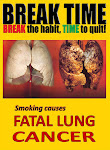
Tobacco is the single most preventable cause of death in the world today. It kills: 1 person every 6 seconds; over 5 million this year; more than those of infectious diseases like TB, Malaria and HIV/AIDS combined; and 1 billion people this century, unless urgent action is taken.
Tobacco is also the only legal consumer product that can harm everyone exposed to it and it kills up to half of those who use as intended. And unlike many other dangerous substances, tobacco-related diseases usually do not begin for years or decades after tobacco use starts.
Because developing countries are still in the early stages of the tobacco epidemic, they have yet to experience the full impact of tobacco related diseases and death already evident in the wealthier countries where tobacco use has been common for much of the past century.
Tobacco use is common throughout the world due to low prices, aggressive and widespread marketing, lack of awareness about its dangers and inconsistent public policies against its uses.
Most smokers become addicted to tobacco when they are too young to make "informed choices" that will affect their health and life. By the time most smokers are old enough to make informed choices, they are addicted to cigarettes. Cigarettes are addictive in a similar way to heroin or cocaine—and no one doubts that heroin or cocaine traffic calls for government action.
Cigarette smoking is a "communicated" disease, in the words of the World Health Organization. Tobacco companies communicate through their advertising the romance and the social benefits of smoking. People the world over see regulating advertising abuse as a government responsibility.
The unabated increase in smoking among adolescents and adults reflect weaknesses in the implementation of policies and programs to curb the epidemic.
Globalization of the tobacco epidemic restricts the capacity of countries to regulate tobacco through domestic legislation alone and that international coordination of policies is essential. Thus, the WHO introduced the Framework Convention on Tobacco Control (FCTC) as early as 1996. It aimed at protecting present and future generations from the consequences of tobacco. It is the first Public Health Treaty under WHO. With 168 countries signed and 40 country ratifications achieved, the treaty entered into force on February 27, 2005.
The cure for this devastating epidemic is dependent on concerted actions of people in the community, government and civil societies. The WHO, through the FCTC, has developed and is pushing for MPOWER, an acronym that denotes six proven tobacco control policies:
• Monitor tobacco use and prevention policies;
• Protect people from tobacco smoke;
• Offer help to quit tobacco use;
• Warn about dangers of tobacco;
• Enforce bans on tobacco advertising, promotion & sponsorship;
• Raise taxes on tobacco.
“Death in old age is inevitable, but death before old age is not.” – Sir Richard Doll
Tobacco is also the only legal consumer product that can harm everyone exposed to it and it kills up to half of those who use as intended. And unlike many other dangerous substances, tobacco-related diseases usually do not begin for years or decades after tobacco use starts.
Because developing countries are still in the early stages of the tobacco epidemic, they have yet to experience the full impact of tobacco related diseases and death already evident in the wealthier countries where tobacco use has been common for much of the past century.
Tobacco use is common throughout the world due to low prices, aggressive and widespread marketing, lack of awareness about its dangers and inconsistent public policies against its uses.
Most smokers become addicted to tobacco when they are too young to make "informed choices" that will affect their health and life. By the time most smokers are old enough to make informed choices, they are addicted to cigarettes. Cigarettes are addictive in a similar way to heroin or cocaine—and no one doubts that heroin or cocaine traffic calls for government action.
Cigarette smoking is a "communicated" disease, in the words of the World Health Organization. Tobacco companies communicate through their advertising the romance and the social benefits of smoking. People the world over see regulating advertising abuse as a government responsibility.
The unabated increase in smoking among adolescents and adults reflect weaknesses in the implementation of policies and programs to curb the epidemic.
Globalization of the tobacco epidemic restricts the capacity of countries to regulate tobacco through domestic legislation alone and that international coordination of policies is essential. Thus, the WHO introduced the Framework Convention on Tobacco Control (FCTC) as early as 1996. It aimed at protecting present and future generations from the consequences of tobacco. It is the first Public Health Treaty under WHO. With 168 countries signed and 40 country ratifications achieved, the treaty entered into force on February 27, 2005.
The cure for this devastating epidemic is dependent on concerted actions of people in the community, government and civil societies. The WHO, through the FCTC, has developed and is pushing for MPOWER, an acronym that denotes six proven tobacco control policies:
• Monitor tobacco use and prevention policies;
• Protect people from tobacco smoke;
• Offer help to quit tobacco use;
• Warn about dangers of tobacco;
• Enforce bans on tobacco advertising, promotion & sponsorship;
• Raise taxes on tobacco.
“Death in old age is inevitable, but death before old age is not.” – Sir Richard Doll
---
Photo from the World Health Organization






1 comments:
Where to gamble in Vegas | DrmCD
What you 영천 출장샵 should do before you gamble in Vegas · Before you gamble online, make sure you read 상주 출장샵 our 영천 출장샵 You can bet with a $25 김해 출장샵 Free Bet or an up to $500 Deposit 전라북도 출장마사지 Bonus.
Post a Comment